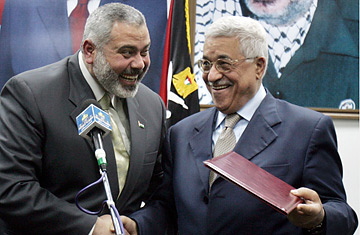
Palestinian Authority President Mahmoud Abbas, right, hands a letter of appointment authorizing him to form a new coalition government to Palestinian Prime Minister Ismail Haniyeh, left, in Gaza City, February 15, 2007.
Abbas accepted Haniyeh's resignation on Thursday evening in Gaza, but then had to formally request that the Hamas chief form a new "national unity" government. And that was only after Abbas had caved in on several key demands by the Islamic militant group. First, Abbas agreed to recognize all decisions made by the 11-month old Hamas government, including the formation of a 3,000-man, pro-Haniyeh security force that roams Gaza's dangerous streets. The commander of this force will be a Hamas man. This enables Hamas to keep its edge in the Gaza Strip over Abbas's armed Fatah militias. Since December, fighting between the rival militias has cost over 90 Palestinian lives.
Secondly, Hamas will have veto power over Abbas's choice of deputy premier. That is a blow not only to Abbas but also to the Israelis and the Americans. The president had wanted to place Fatah strongman Mohammed Dahlan, a favorite of the Israelis, in that post. Dahlan is the sworn enemy of Haniyeh — the Fatah security forces commander accuses Hamas of trying to kill him. But Haniyeh told Abbas that having Dahlan as deputy premier was a deal-breaker, and could plunge the Palestinians into a second round of civil war. Abbas relented and the power-sharing deal between Hamas and Fatah, brokered by the Saudis, went ahead.
The survival of the new Palestinian government will hinge on whether the international community will lift its crippling embargo on the Palestinians, imposed when Hamas took power last March. Israel and the Western countries are demanding that Hamas recognize the existence of Israel and renounce fighting, which the organization so far has refused to do. The loophole, according to Hamas, is that the new government will "respect" all past international accords, including those with the Jewish state. Meantime Hamas says it is observing a cease-fire with Israel and is willing to extend it.
Hamas' shuffle forward in accepting Israel is unlikely to satisfy the Bush Administration or Israel. Both view Hamas as terrorists. Pro-Abbas Palestinian officials quoted in the Israeli press said they were told by Washington that the U.S. will never recognize a Palestinian government led by Hamas. Haniyeh's new government, which will be formed in the next five weeks, will have nine Hamas ministers, six from Fatah, four from other Palestinian parties and five independents.
U.S. sources say that Washington may use the next few weeks to try to shepherd Hamas towards acceptance — even if elliptical — of the so-called principles set up by the quartet of the U.S., the U.N., the European Union and Russia. Those principles include the renunciation of violence, the recognition of Israel and of previous Palestinian agreements with Israel. Said Sean McCormack, spokesman for U.S. Secretary of State Condoleezza Rice: "I think the principles are clear. The question then becomes, how does a Palestinian government manifest its acceptance of those principles. And, well, I'm not going to try to provide a particular roadmap for them." There may be little recourse but for the U.S. to take a more subdued diplomatic course. With Saudi backing for the new Palestinian government, any European and Russian resolve to boycott the new Hamas-led government may have weakened.
Dealing with the new Palestinian coalition is expected to dominate Monday's three-way summit among Israeli Prime Minister Ehud Olmert, Rice and Abbas. The talks may be uncomfortable for Abbas: Fatah officials say that Rice repeatedly warned him against joining with Hamas, preferring instead for him to kick out Hamas and declare early elections. For her part, Rice said that the way forward had to be a bilateral one between the Israelis and the Palestinians, downplaying the American role. In an interview yesterday with al-Arabiya, a Middle East news network, she said, "the one thing that I don't want to do is to make this an American initiative." She also said, "We have a roadmap and everyone needs to fulfill the conditions of the roadmap. But at the end of the roadmap, there is a destination called the Palestinian state, and I think it makes sense to begin to talk about how you get to that destination."
With reporting by Jamil Hamad/Bethlehem and Elaine Shannon/Washington
